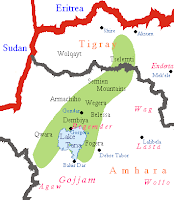A Jewish-Italian traveler and Jewish scholar, Elijah of Ferrara, writes to his children in 1435 that he had encountered a member of this group. He says they follow a blend of oral and written traditions, that they did not observe Hanukkah, were not familiar with the Talmud, and that they included the Book of Esther (a later addition to the Bible that does not mention God and whose historicity has been questioned).
Around that time, Ethiopian missionaries decided to evangelize the Jewish communities in the Semien Mountains, which led to rebellion. The rebellion was dealt with brutally by Emperor Zara Yaqob (1399 - 1468), who mounted a strong campaign against any un-Christian practices. Zara Yaqob in one chronicle was given the title "Exterminator of the Jews."
The 1500s saw the Chief Rabbi of Egypt acknowledging the Beta Israel as "ethnically Jewish." It also saw the imam of the Adal Sultanate (an eastern region of Ethiopia populated by Muslims) attacking Ethiopia, forcing Emperor Dawit II to hide in the Semien Mountains. Pursuing him, the imam found the Jewish community there, who promised to be loyal to the imam if he would free them from persecution by the Christians. He did so, but later they switched their allegiance back to Dawit's son Galawdewos when he became emperor.
Revolts of the Beta Israel in 1614 and 1625 led to the successful suppression of their independence. The Jewish became forbidden in Ethiopia, and much of their culture was lost. The mid-19th century saw the beginning of "modern Ethiopia"; at the time, there were at least 200,000 Jews living there. Although there were still attempts to convert them, and questions as to how Jewish they were (compared to "mainstream" Middle Eastern Judaism), the Beta Israel community exists today.
The man who claimed they were of the Tribe of Dan traveled extensively and had many stories of the Lost Tribes of Israel in the Middle Ages. Let's see what he had to say next time.

